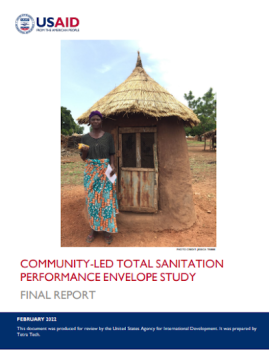Community-led total sanitation (CLTS) is the most widely employed approach to reduce open defecation in rural areas. It has been implemented in nearly 60 countries and is part of the national sanitation strategy in approximately half of those countries (Zuin et al., 2019). Both contextual and implementation factors can bear upon CLTS program performance and success, forming a “performance envelope” of factors under which the intervention is more likely to succeed. Examining these factors carefully offers insights for improving decision making on where and how CLTS programs are delivered in the future.
Through the CLTS Performance Envelope research activities, the Water, Sanitation, and Hygiene Partnerships and Learning for Sustainability (WASHPaLS) project examined how local context and program implementation strategies affect CLTS outcomes across multiple countries. The aim of this research is to provide governments, donors, and implementing organizations with insights to i) better target CLTS activities to areas with the highest likelihood of success and ii) adapt implementation strategies to maximize the chances for their success and sustainability.
Related resources:
- Where Does CLTS Work Best? Quantifying Predictors of CLTS Performance in Four Countries
- Targeting Community-Led Total Sanitation (CLTS) to Favorable Contexts: Factors contributing to the success of CLTS in Ghana
- Targeting Community-Led Total Sanitation (CLTS) to Favorable Contexts: Factors contributing to the success of CLTS in Cambodia
- Targeting Community-Led Total Sanitation (CLTS) to Favorable Contexts: Factors contributing to the success of CLTS in Zambia
- Targeting Community-Led Total Sanitation (CLTS) to Favorable Contexts: Factors contributing to the success of CLTS in Liberia


